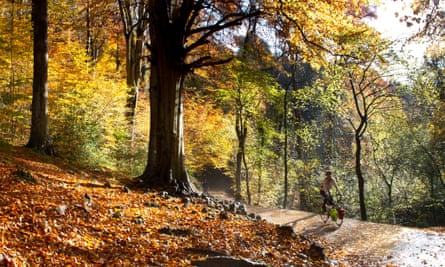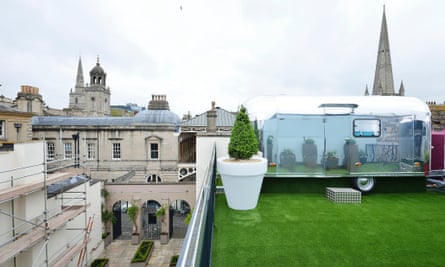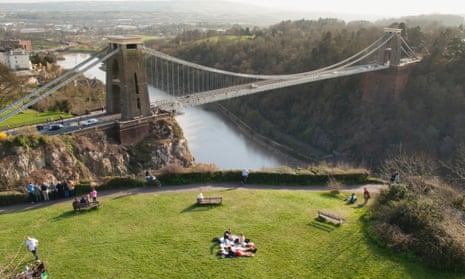Bristol is a city with one foot in the countryside. Acres of hilly allotments slope into wildlife corridors and riverside cycle paths. It’s big on slow food, urban farmers’ markets, city farms and free-range thinking (think street art, independent shops, an independent mayor, and a local currency – the Bristol Pound is now widely accepted). The BBC’s Natural History Unit is based here; so is transport charity Sustrans and the ethical Triodos Bank. And now, thanks to all this grassroots greenery, Bristol is the first UK city to be named a European Green Capital since the awards began in 2010. The year-long eco-fest begins on 24 January.
Things to do

Hire a bike from Cycle the City and pedal around Bristol’s hilly but bike-friendly streets. It’s a hub of national cycle routes: a good off-road route follows the disused railway line – part of Sustrans’ route 41 – which runs through the Avon Gorge. Though marred by the three-lane Portway road, the rocky gorge is a haven for rare plants, as well as peregrine falcons and feral goats.
It is crossed by Brunel’s iconic suspension bridge, slung between the Georgian terraces of Clifton and the Forestry Commission’s Leigh Woods. From April, the woods will be the backdrop for an installation, called Withdrawn, by artist Luke Jerram. Part of the National Trust’s New Art Bristol project, Withdrawn will feature a series of ghostly fishing boats marooned in the forest, and aims to raise questions about climate change and its impact on our marine environment.
Other events include the Blue Whale Project (a 30-metre walk-in whale to be installed in Millennium Square for six months from mid-April), and Big Green Week in June, with entertainment from film and food to fashion. During August’s Balloon Fiesta, local manufacturer Cameron Balloons will launch a solar-powered hot-air balloon.
A series of summer open days are planned for Triodos Renewables’ wind farm in industrial Avonmouth, which is also home to a biomethane plant which supplies the gas for a human-waste Bio-Bus that runs from Bristol airport to Bath.
The At-Bristol Science Centre on the Harbourside is planning behind-the-scenes tours of its low-energy building – one of the UK’s greenest. (Green-tech marvels include a phase-change tank for storing solar energy, waste baling and a rooftop photovoltaic system, guarded by Brian, a robotic peregrine falcon.) Front of house, the centre entertains with an array of interactive playthings: a planetarium, a walk-through virtual tornado and a DIY animation station – complete with Bristol-born Wallace and Gromit film set. You can’t do Bristol without a bit of Aardman Animations.
Where to eat

Among the many local restaurants that subscribe to the Slow Food movement, a few stand out. In a recycled warehouse on the waterfront, Bordeaux Quay boasts a sustainable approach to everything from ingredients to waste management. The food isn’t cheap (mains from £13.50), but it has a three-star rating from the Sustainable Restaurant Association for its humanely raised meat, home-baked artisan bread and wild, day-boat fish. It has nice views of the harbour, too.
Another three-star restaurant is The Canteen in Stokes Croft, Bristol’s centre of alternative culture. It’s part of Hamilton House, a solar-powered, converted office building which houses a community of artists, musicians and charities and the Bristol Bike Project. Choose from a chalk-board menu – maybe beetroot and spinach gnocchi with garden-pea sauce (£8), or steamed Fowey mussels (£8.50). There is live music every night, 10% of profits go to local causes and you get a free bowl of soup with every meal.
Bristol is very good at homegrown micro chains. One of them, Friska – with four cafe-takeaways around the city – was recently named best ethical restaurant by Observer Food Monthly. Try one of its tasty hot boxes (Thai chicken curry or grilled halloumi with roast veg, £5.25).
The curse of takeaway waste is neatly taken care of by the Thali Café chain’s excellent tiffin scheme (tiffin dishes are really between-meal snacks, but can be eaten as mains). You buy a Mumbai-style stainless steel tiffin pot and make regular trips to your local Thali Café (there are four of them) for refills. Some 10,000 people in the city now have a Thali tiffin (dishes start at £8.95 and are served with rice and dahl). Menu highlights include Goan fish curry, Punjab kebabs and masala dosas, all inspired by Indian street food.
Finally, there’s the “junk food” option: Skipchen is a pop-up, pay-as-you-feel cafe in Stokes Croft that sources most of its ingredients from supermarket surplus. For a voluntary donation, you might try kiln-roasted salmon with watercress and white wine sauce. The food is on the cusp of a best-before date, but nobody’s died.
Where to stay

The only B&B in the city to earn a Green Tourism gold award is The Greenhouse in Southville (doubles from £105 B&B). Fitted carpets are made from recycled plastic, there’s wool insulation under the floors, solar panels on the roof, a bike store and electric bikes for hire, but the rooms are otherwise conventional.
More central is Rockets on the Roof at Brooks Guesthouse (doubles from £70), which offers glamping in four British-made Airstream lookalikes on an astroturfed rooftop four floors above historic Corn Street. Each polished-metal caravan has a double bed, eco-heating and shower, LED lights (including coloured mood lights) and views of spires and clock towers.
Bristol’s Airbnb listings include a “modern, inner-city eco house” in a corner of the delightfully untidy garden of a former farmhouse on Redland Green, which has three bedrooms, a wood-burner and a heat-exchange boiler (from £135 a night, sleeps five); and, in a suburban street close to the M32 flyover, a “Cosy Eco Cabin” (£49 a night) is set among fruit trees in a large bucolic garden overlooking the Frome river and Eastville Park lake. From this woody cabin with outdoor compost loo, you can look out for swans and kingfishers.

Comments (…)
Sign in or create your Guardian account to join the discussion